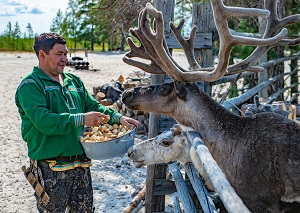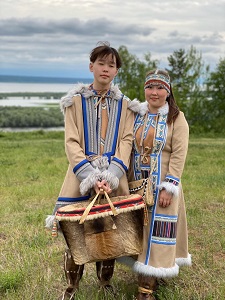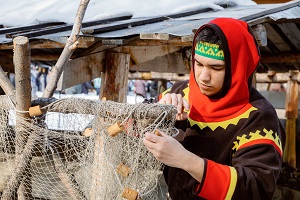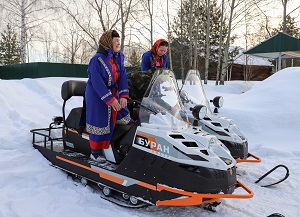Please activate JavaScript in your browser to use all interface options.
Rosneft Helps to Preserve Way of Life and Cultural Traditions of Indigenous Peoples
09 August 2022
Rosneft celebrates the International Day of the World’s Indigenous Peoples. Since the beginning of the year, the Company and its subsidiaries have implemented more than 120 projects to support indigenous communities in the regions of operation.
Preservation of the culture and way of life of the indigenous peoples of the North is one of the key areas of Rosneft’s social policy. The Company runs charity and grant projects in the Taimyr Peninsula, Krasnoyarsk and Khabarovsk Territories, Irkutsk and Tyumen Regions, Khanty-Mansi Autonomous District—Yugra, Yamal-Nenets and Nenets Autonomous Districts, and the Republic of Sakha (Yakutia).
Last year alone, RN-Vankor, one of Rosneft’s largest enterprises, built over two dozen comfortable homes for indigenous people in the north of Krasnoyarsk Territory and in the YNAO. This year, the enterprise is building 23 more houses and upgrading playgrounds, as well as providing new equipment for cultural, sports and educational institutions in the indigenous settlements.
 Taas-Yuryakh Neftegazodobycha is renovating the Botuobuyinsky nasleg (settlement) in the Republic of Sakha (Yakutia), where the enterprise has redeveloped the Milestones of History square, built a kindergarten and a multifunctional school stadium for athletics and games.
Taas-Yuryakh Neftegazodobycha is renovating the Botuobuyinsky nasleg (settlement) in the Republic of Sakha (Yakutia), where the enterprise has redeveloped the Milestones of History square, built a kindergarten and a multifunctional school stadium for athletics and games.
Earlier, the Company supported the restoration of the Kharampur national settlement in the Purovsky district of YNAO, and built capital houses stylised as indigenous chums. This year, RN-Purneftegaz that operates in the region has begun detailing the roaming grounds of the forest Nenets, which will help to update and preserve their ancestral territories and ensure that the traditional forms of economic activity of the forest Nenets are not impacted by production activities.
Rosneft is working on a unique IT project in Khanty-Mansi Autonomous District—Yugra to connect indigenous residents of remote settlements to the Internet. In three years, some 1,600 residents of Yugra’s ancestral lands have been connected to the Internet and now make active use of the unified portal for state and municipal services, receive remote medical consultations and nurture their preschool children on the Stoybishche School-Kindergarten educational platform. This year, 270 indigenous persons have gained access to the World Wide Web, and 40 more will be connected by the end of the year.
 In Irkutsk Region, Verkhnechonskneftegaz supports legal literacy education programmes for community heads. In Tyumen Region, RN-Uvatneftegaz has taught indigenous children the basics of construction and robotics in a new class in the Uvat district of Tyumen Region.
In Irkutsk Region, Verkhnechonskneftegaz supports legal literacy education programmes for community heads. In Tyumen Region, RN-Uvatneftegaz has taught indigenous children the basics of construction and robotics in a new class in the Uvat district of Tyumen Region.
In Khanty-Mansi Autonomous District—Yugra, RN-Yuganskneftegaz has been consistently supporting the indigenous communities of Yaun-Yakh and Negus-Yakh. The enterprise provides local residents with fuel and lubricants, construction materials, machinery, food delivery, medical treatment and school preparation for children. RN-Yuganskneftegaz has repeatedly won the annual “Yugra’s Black Gold” competition in the category “For Cooperation with the Indigenous Population” based on its work with indigenous minorities.
RN-Vankor, RN-Uvatneftegaz, Tyumenneftegaz, Samotlorneftegaz, RN-Purneftegaz, Rospan International, Verkhnechonskneftegaz, Taas-Yuryakh Neftegazodobycha, Slavneft-Krasnoyarskneftegaz, Vostsibneftegaz and Komsomolsk Oil Refinery provide assistance in holding major ritual holidays of indigenous peoples in the regions of operation.
 Participants of the Reindeer Herder’s Day, Fisherman’s Day and Crow’s Day demonstrate their skills in reindeer sled races, hunting by skis, rowing on oblas (boats), throwing tynzyan to the khorey (a harness thrown over a long pole used to chase reindeer), stacking and transporting firewood on sleds, as well as fitting and disassembling reindeer harness. Winners of the various competitions are awarded prizes by the oil workers, which the indigenous people use for their livelihoods, such as snowmobiles and motorboats, electric generators and solar panels, freezers and ice drills, satellite antennas.
Participants of the Reindeer Herder’s Day, Fisherman’s Day and Crow’s Day demonstrate their skills in reindeer sled races, hunting by skis, rowing on oblas (boats), throwing tynzyan to the khorey (a harness thrown over a long pole used to chase reindeer), stacking and transporting firewood on sleds, as well as fitting and disassembling reindeer harness. Winners of the various competitions are awarded prizes by the oil workers, which the indigenous people use for their livelihoods, such as snowmobiles and motorboats, electric generators and solar panels, freezers and ice drills, satellite antennas.
This year, the Evenki folk ensemble Togokon first toured the Yurubcheno-Tokhomskoye field of Vostsibneftegaz.
Ethnic celebrations are always well attended, with a large number of people learning about indigenous traditions, participating in workshops, learning about folklore, sampling national cuisine and buying traditional handicrafts.
Rosneft undertakes extensive scientific work to address the practical challenges of supporting indigenous peoples. The number of grant projects by the Company’s enterprises—Vostsibneftegaz, RN-Uvatneftegaz, Tyumenneftegaz and RN-Purneftegaz—increases every year. The research helps to preserve the ancestral territories of indigenous peoples and their unique cultural heritage, as well as to study populations of red-listed animals and birds that are bio-indicators of indigenous territories.
The results of environmental projects are brought up for discussion at the ECOARCTICA forum, organised by RN-Shelf-Arctic to promote open dialogue between indigenous peoples, the scientific community, subsoil users and the authorities.
The oil workers’ assistance has become a key factor for communities in all regions of the Company’s operations, helping to improve quality of life, increase employment and preserve traditions.
Rosneft Information Division
August 9, 2022

-315xx70.png)

